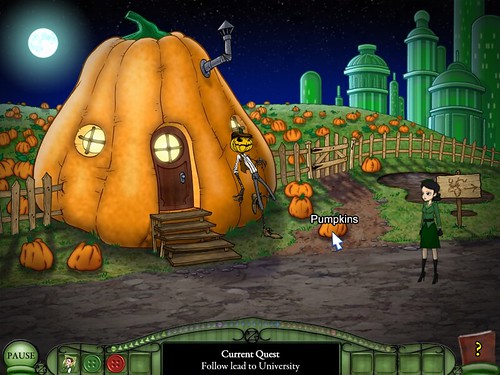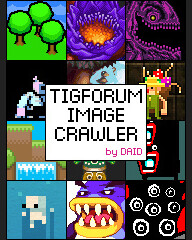Emerald City Confidential
By: Derek Yu
On: February 25th, 2009
Emerald City Confidential is a new point-and-click adventure game from Dave Gilbert, creator of The Shivah and the Blackwell series. I’m a big fan of The Shivah, which is notable for starring a conflicted rabbi, but earns my respect as a very well-written, humanistic, and entertaining game. So it’s with some disappointment that Emerald City Confidential is perceptibly marred for me by what I can only describe as “casualitis.”
Warning, I’m going to go on a serious tangent by the end of this post.
The game takes place in the world of Oz. You play Petra, a tough, no-nonsense private eye living in the Emerald City, looking to make some emeralds and right some wrongs in the process. Since the classic 1939 film, there have been quite a few other successful adaptations of L. Frank Baum’s fantasy world (which is now in the public domain): off the top of my head, I can think of Return to Oz, Disney’s dark semi-sequel, Wicked, the popular musical, and The Wizard of Oz 3: Dorothy Goes to Hell, a lowbrow animated movie by James “Angry Video Game Nerd” Rolfe and Mike Matei. I’ve seen all three, enjoyed all three immensely, and I have to say, I also really like Gilbert’s noir imagining, which includes a lot of the characters from the twisted Disney movie.
Unfortunately, being published by PlayFirst, ECC includes a lot of concessions to casual game players, like meaningless rewards, and Captain Obvious-style hints and hand-holding. The most egregious of these are the condescending “quest” pop-ups that appear at every turn of the game. By way of example, there’s one point where you receive a quest to go to the docks, receive a congratulatory message for arriving, immediately receive another quest to talk to someone who’s standing two feet away, and then receive a congratulations for successfully speaking to her. It’s literally four clicks for as many pop-ups. Zero thinking involved.
And I can’t help but think that the button-collecting minigame is an obvious nod to the “hidden object”-style games that are popular (and lucrative) in the casual gaming world. It’s a fun way of unlocking concept art made for the game. It’s also a pointless distraction from the game itself.
Which brings me tangentially to this: the idea of rewards in games is worth discussing with regards to their design. The coin, the ring, the cutscene, the minigame, the achievement… the “CONGRATURATION,” if you will. It’s become obvious to me that the way to define casual games is not by any particular genre, but by how the ratio of reward versus achievement is skewed toward the former. When it becomes skewed enough, it’s at best vaguely insulting toward the player and distracting, as it is in ECC. At worst, it conditions the player to be more of a spectator than an active participant in the playing.
In fact, I can’t help but think that the most damning argument against games as a worthwhile medium is that its creators feel like they have to add these kinds of rewards to make the experience enjoyable. When a superficial reward becomes more than a fun extra and becomes a majority shareholder in Why Are We Playing, Inc., then something is wrong. At least when monkeys press buttons for pellets they are participating in scientific research (supposedly).
This problem, however, ultimately does not just belong to casual developers, but to all developers, mainstream and indie, and myself included. If games are meant to be played, and we cannot convince someone to play without rewarding them every step of the way, then I think we have failed, and I think we are contributing to what Aldous Huxley described as the “”http://en.wikipedia.org/wiki/Brave_New_World">Brave New World," a society doomed by endless, irrelevant distractions; a society doomed by having its every need immediately fulfilled, with as little effort as possible.
To bring it back to Emerald City Confidential, I love the world Dave Gilbert has constructed, and I love the writing. The artwork and voice acting are both quite good (although hurt slightly by compression). But I really hope that his next game is not with PlayFirst, because what I see as their influence has done no service to his design except to make it more palatable to an audience that could probably enjoy it at a more “adult” level if they tried. And in my opinion, we should make them try.
TIGdb: Entry for Emerald City Confidential
-
Derek
-
failrate
-
Diverse
-
http://randomzoo.com/ Random
-
http://www.4colorrebellion.com hokku
-
Robert
-
http://www.adamatomic.com/ Adam Atomic
-
http://www.adamatomic.com/ Adam Atomic
-
Derek
-
bateleur
-
Krystian Majewski
-
http://ptoing.blogspot.com ptoing
-
Admiral Frosty
-
Ilya Chentsov
-
Jason Dyer
-
Lurk
-
Arseus
-
Xander
-
scrubking
-
http://chaoseed.com/garden John Evans
-
The Ivy
-
http://www.b-mcc.com/ BMcC
-
http://trabitboy.dev-fr.org trabitboy
-
ThatGuy
-
Kobel
-
Jay
-
Dave Gilbert
-
salade
-
Derek
-
Derek
-
http://rmvx.gameclover.com RMVX
-
Stargoat
-
The Monster King Ren
-
ThatGuy
-
ThatGuy
-
ThatGuy
-
torncanvas
-
lattice
-
ThatGuy
-
Ilia Chentsov
-
ThatGuy
-
Ilia Chentsov
-
ThatGuy
-
Ilya Chentsov
-
ThatGuy
-
BluWacky


